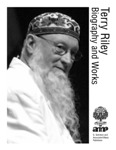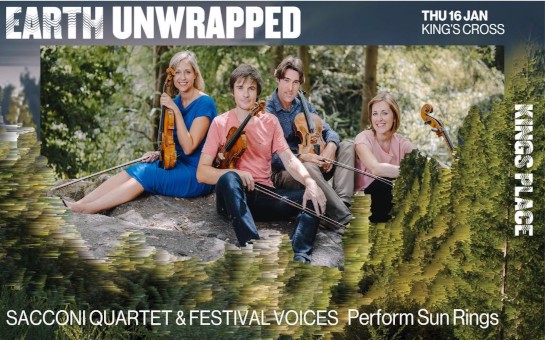Terry Riley
b. 1935
American
Summary
Performers who have commissioned and/or played his works include: Kronos Quartet, Rova Saxophone Quartet, ARTE Quartet, Array Music, Zeitgeist, Steven Scott Bowed Piano Ensemble, John Zorn, Sarah Cahill, California E.A.R. Unit, guitarist David Tanenbaum, electric violinist Tracy Silverman, drummer George Marsh, bassist Bill Douglass, the Assad brothers, cello octet Conjunto Ibérico, Crash Ensemble, Abel Steinberg-Winant Trio, pianists Werner Bartschi and Gloria Cheng, Calder Quartet, Arditti Quartet, Amati Quartet, Alter Ego, Sounds Bazaar, Paul Dresher, singer Amelia Cuni, Bang-on-a-Can All Stars, and guitarist Gyan Riley.
Biography
Composer and performer Terry Riley is one of the founders of music’s Minimalist movement. His early works, notably In C (1964), pioneered a form in Western music based on structured interlocking repetitive patterns. The influence of Riley’s hypnotic, multi-layered, polymetric, brightly orchestrated Eastern-flavored improvisations and compositions is heard across the span of contemporary and popular music.
Performers who have commissioned and/or played his works include: Kronos Quartet, Rova Saxophone Quartet, ARTE Quartet, Array Music, Zeitgeist, Steven Scott Bowed Piano Ensemble, John Zorn, Sarah Cahill, California E.A.R. Unit, guitarist David Tanenbaum, electric violinist Tracy Silverman, drummer George Marsh, bassist Bill Douglass, the Assad brothers, cello octet Conjunto Ibérico, Crash Ensemble, Abel Steinberg-Winant Trio, pianists Werner Bartschi and Gloria Cheng, Calder Quartet, Arditti Quartet, Amati Quartet, Alter Ego, Sounds Bazaar, Paul Dresher, singer Amelia Cuni, Bang-on-a-Can All Stars, and guitarist Gyan Riley.
Born in Colfax, California, Riley studied at Shasta College, San Francisco State University, and the San Francisco Conservatory before earning an MA in composition at the University of California, Berkeley, studying with Seymour Shifrin and Robert Erickson. At UC Berkeley, he met La Monte Young; together they worked with the dancer Anna Halprin. During a sojourn to Europe 1962-64, he collaborated with members of the Fluxus group, playwright Ken Dewey, and trumpeter Chet Baker, and was involved in street theater and happenings. In 1965 he moved to New York and joined La Monte Young’s "Theater of Eternal Music." 1967 was the year of his first all-night concert at the Philadelphia College of Art and he began a collaboration with visual artist Robert Benson. An influential teacher was Pandit Pran Nath, a master of Indian classical voice; Riley appeared in concert with him as tampura, tabla and vocal accompanist for over 25 years. Riley continues to perform in concerts of his music and of Indian classical music, as well as conducting raga-singing seminars. He also appears in concerts with Indian sitarist Krishna Bhatt, saxophonist George Brooks, guitarist Gyan Riley and with virtuoso Italian bassist, Stefano Scodanibbio. 
Biography and Worklist
Riley joined the Mills College faculty in 1971. There he met David Harrington of the Kronos Quartet. Their long association led to 13 string quartets, the concerto The Sands (1990), the multimedia choral work commissioned by NASA, Sun Rings (2003), and The Cusp of Magic (2004) with pipa. The Kronos recording of his epic five-quartet cycle, Salome Dances for Peace was selected as the Classical album of the year by "USA Today" and was nominated for a Grammy.
The Palmian Chord Ryddle, a concerto, was premiered in May 2012 by electric violinist Tracy Silverman and The Nashville Symphony led by conductor Giancarlo Guerrero. A subsequent performance occurred at Carnegie Hall. Recent works include Transylvanian Horn Courtship (2008) for string quartet doubling on Stroh instruments, Universal Bridge (2008) for pipe organ, the violin concerto Zephir (2009), and SwarAmant (2012) for violin, guitar, and tabla.
Past commissions include: the orchestral Jade Palace (1991) for Carnegie Hall’s centennial celebration, premiered there by the Saint Louis Symphony and Leonard Slatkin; June Buddhas (1991) for chorus and orchestra, based on Jack Kerouac's "Mexico City Blues," commissioned by the Koussevitsky Foundation; the chamber vocal work What the River Said (1997) by the Norwich Festival; the piano piece in just intonation The Dream (1999) by the Kanagawa Foundation; the concerto for piano and electro-acoustic band Banana Humberto 2000 (2000) commissioned by Musical Traditions, Inc., the Krannert Center for the Performing Arts, and Emory University, and premiered and toured by Riley with the Paul Dresher Ensemble; Bruce’s Traveling Machine (2005) for cello and tape, commissioned by the artist Bruce Connor; The Heaven Ladder, Book 6 (Night Music) (2006) for piano 4-hands, commissioned by Sarah Cahill and premiered by Sarah Cahill and Joseph Kubera; Loops for Ancient-Giant-Nude-Hairy Warriors Racing Down the Slopes of Battle (2006) for the Crash Ensemble; the triple concerto SolTierraLuna (2007), co-commissioned by the Chamber Orchestra of Philadelphia and the New Century Chamber Orchestra of San Francisco.
His music is published by Associated Music Publishers, Inc.
— June 2017
For specific inquiries about this composer, please contact Andrew.Stein-Zeller@schirmer.com.
News

- Terry Riley's 90th Year Commences with Sun Rings at Kings Place
- 14th January 2025
- Turning 90 in 2025, composer Terry Riley has earned a firm place in the collective of legendary composers of our time. On January 16, London’s Kings Place launches a celebration of Riley’s birthday with a live performance of his masterful Sun Rings.

- Claire Chase, JACK Quartet Premiere Terry Riley’s The Holy Liftoff
- 1st May 2024
- On May 2 at Public Records in Brooklyn, New York, flutist and MacArthur Fellow Claire Chase and the JACK Quartet perform the world premiere of The Holy Liftoff, the new modular score from composer Terry Riley.

- Big Ears 2023: US Premiere of Terry Riley’s 'Ki', Shara Nova sings 'The Blue Hour'
- 30th March 2023
- The Big Ears Festival celebrates its 10th anniversary this weekend. Concluding its eclectic offerings on April 2, 2023, are two major works from the Wise Music catalog.

- Dream House Quartet premieres new works by Dessner and Thorvaldsdottir
- 30th May 2022
- Dream House Quartet premieres new works by Bryce Dessner and Anna Thorvaldsdottir at London's Royal Festival Hall

- Sasha Waltz & Guests Premiere 'In C' at Brooklyn Academy of Music
- 19th April 2022
- Choreographer Sasha Waltz brings Terry Riley's 'In C' to the Brooklyn Academy of Music with the Bang on a Can All-Stars April 28-30, 2022 in a US choreographic premiere.

- Sasha Waltz & Guests dance Terry Riley's In C
- 24th February 2021
- On March 6, the new dance project In C by Sasha Waltz will be performed for the first time. The premiere will be broadcasted on ARTE TV and will be available via livestream. The musical work In C, written in 1964 by...
Performances
26th April 2025
- SOLOISTS
- Dorothee Oberlinger, alto flute; Marianna Julia Żołnacz
- PERFORMERS
- Members of Dresdner Philharmonie
- LOCATION
- Philharmonie, Dresden, Germany
23rd May 2025
- PERFORMERS
- Sasha Waltz & Guests ; The Young Gods
- LOCATION
- Schauspielhaus, Dresden, Germany
12th June 2025
- SOLOISTS
- Kronos Quartet
- PERFORMERS
- The Next Festival of Emerging Artists
- CONDUCTOR
- Peter Askim
- LOCATION
- PS 21 Center for Contemporary Performance, Chatham, NY, United States of America
13th June 2025
- SOLOISTS
- Kronos Quartet
- PERFORMERS
- The Next Festival of Emerging Artists
- CONDUCTOR
- Peter Askim
- LOCATION
- Merkin Concert Hall at Kaufmann Music Center, New York, NY, United States of America
3rd July 2025
- PERFORMERS
- Ensemble Musikfabrik ; Sasha Waltz & Guests
- LOCATION
- Radialsystem, Berlin, Germany
Features

- The Best Recordings of 2022 from Wise Music Classical
- Wise Music Classical invites you to enjoy a selection of the best recordings of 2022, featuring composers from across our international family of publishing houses.

- Independent Repertoire: American Minimalism
- Minimalism is one of the most important musical innovations of the 20th century, and was pioneered by a number of different American composers. Though each of the composers listed here has developed his own personal approach to the idiom, the resonance, pulse, drones, gradual change, and repetition that characterize minimalism all hold enduring appeal today.
Photos

Discography
- LabelCantaloupe
- EnsembleBang on a Can All-Stars
- Released25th March 2022
- Works
- LabelThe Night With...
- EnsembleEnsemble 1604
- Released6th March 2020
- Works
- LabelCantaloupe Music
- Catalogue NumberCA21127
- ConductorPaul Hillier
- EnsembleArs Nova Copenhagen
- Released19th May 2017
- Works
- LabelDeutsche Grammophon
- Catalogue Number4814471
- SoloistKatia Labèque, Marielle Labèque, piano
- Released2016
- Works
- LabelNonesuch
- Catalogue Number7559-79503-8
- EnsembleKronos Quartet
- Released23rd June 2015
- Works
- LabelSono Luminus
- Catalogue Number92189
- EnsembleZofo Duo
- Released26th May 2015
- Works
- Etude from the Old Country, from The Heaven Ladder, Book 5
- Jaztine, from The Heaven Ladder, Book 5
- Tango Doble Ladiado, from The Heaven Ladder, Book 5
- Half-Wolf Dances Mad in Moonlight
- G Song
- Praying Mantis Rag
- Waltz for Charismas, from The Heaven Ladder, Book 5
- Cinco de Mayo, from The Heaven Ladder, Book 5
- LabelCrescent Phase
- SoloistMatt Starling
- Released22nd March 2015
- Works
- LabelMirumir
- EnsembleRoberto Cacciapaglia Ensemble
- Released17th March 2015
- Works
- LabelAfrica Express
- Catalogue NumberTRANS186CD
- ConductorAndré de Ridder
- SoloistAdama Koita, Alou Coulibaly, Andi Toma, Badou Mbaye, Bijou, Brian Eno, Cheick Diallo, Damon Albarn, Djelifily Sako, Guindo Sala, Jeff Wootton, Kalifa Kone, Meme Kone, Modibo Diawara, Nick Zinner, Olugbenga
- Released26th January 2015
- Works
- LabelCherry Red Records
- Catalogue Number2448
- SoloistTerry Riley and John Cale
- Released15th July 2014
- Works
Autodreamographical Tales

The Night With... Live Vol. One

first drop

Minimalist Dream House

Sunrise of the Planetary Dream Collector

ZOFO plays Terry Riley


In C

In C Mali

Church of Anthrax

